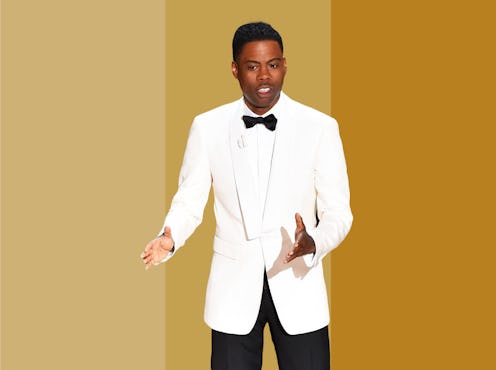Entertainment
The 2016 Oscars Ceremony Attacked #OscarsSoWhite

On the ABC red carpet pre-show, Kerry Washington made a perfect point. "If you look at the history of movements, the history of change, a lot of voices are needed at the table. I really respect and actually admire some of the people who are not here tonight, I really get it. But for me, I felt like my voice, in my heart, my voice is best used at the table," said Washington, who has been a member of the Academy for three years. Sadly, two of those three years saw the rise of #OscarsSoWhite, as people of color failed to be nominated in the major acting categories in both 2015 and 2016, despite protests, dialogue, and even boycotts by fans and celebrities alike. Thus, the 2016 Oscars ceremony had a lot stacked against it, and a lot of controversy surrounding it, even before it began. All eyes, mine included, were on them, wondering how the 2016 Oscars would address the diversity issue — and whether or not would they do it well. Unsurprisingly, they did address it. Surprisingly, they did it frequently, and they did it well.
It started with Chris Rock's opening monologue, which seemed to be one #OscarsSoWhite joke after another after another, as the comedian just let loose in his usual racially-aware way. "Welcome to the Oscars, also known as the White People’s Choice Awards," joked Rock. "If they nominated hosts, I wouldn’t even get this job. Y’all would be watching Neil Patrick Harris right now.” From the very beginning, the ceremony made it clear that it would not be pulling any punches when it came to the topic that everyone was curious about, talking about, protesting about. From the very beginning, Rock made it clear that the reason he didn't respond to requests to stand down as host in light of #OscarsSoWhite was exactly as Washington put it: because his voice was best used at the table.
And what a table he built with that voice. Every single one of his monologues included at least one joke at the expense of the Academy or the all-white acting nominees, and in the pre-taped sketches, Rock enlisted the help of other celebrities to get that message across, as well. In one series of sketches, he placed actors of color like Whoopi Goldberg and Leslie Jones in the nominees for Best Picture, using comedy to highlight the fact that black actors can't win awards for roles that they don't get in the first place. In another sketch, he claimed to have visited Compton to ask people "straight outta Compton" what they thought of black actors being excluded from the major acting categories this year. Rock's comedy had its cringe-worthy moments, but, overall, it was intelligent, it was incisive, and it made the points that everyone — myself included — thought would be swept under the rug a lot more during the ceremony.
On top of that, the presenters giving out the award were a diverse group as well. Everyone from Priyanka Chopra to Sofia Vergara, from Kevin Hart to Abraham Attah, from Quincy Jones to John Legend were seen on the stage — making the list of presenters far more inclusive than the 2016 list of nominees could ever even dream of being. If you ignored the fact that almost everyone making their way onto the stage to accept an award that night was white — because, you know, it was largely white people who were nominated — then you might have been fooled into thinking that the 2016 Oscars were the most diverse Oscars in recent memory. And, even among the few winners who weren't white, we had people like Alejandro Iñárritu blithely ignoring the "wrap up" music to hold his Oscar for Best Director and give a beautiful speech hoping that "the color of the skin becomes as irrelevant as the length of our hair."
In the end, the 2016 Oscars ceremony seemed aggressively devoted to correcting the mistakes of the Academy in terms of inclusivity. But the conversation isn’t over, and the ceremony made that clear, too. It’s not enough to diversify a ceremony based around a celebration of white actors and white films. That’s just putting a band-aid on a problem. As long as we keep this dialogue open, and follow these anxious talks with real change — like allowing Rock to spend the entire Oscars spitting in the face of #OscarsSoWhite, like honoring black actors in monologues and sketches, like telling these jokes about race that make people think even while they laugh — then there’s a chance that we might soon see a day where the Oscars ceremony isn’t more diverse than the list of nominees. The Oscars ceremony was bold, it was brave, it was smart, and, above all, it was a perfect statement of what is and isn’t acceptable in Hollywood in this day and age.
Image: Caroline Wurtzel/Bustle